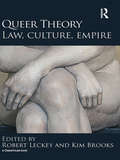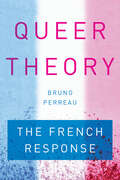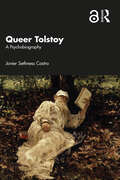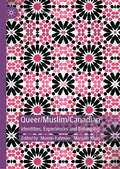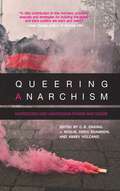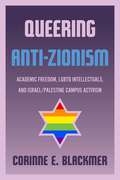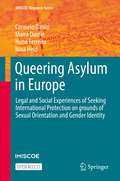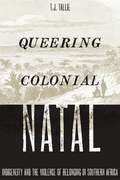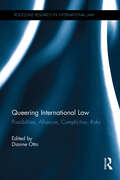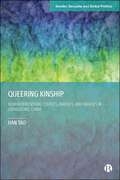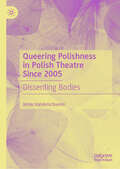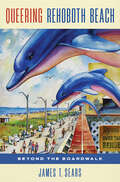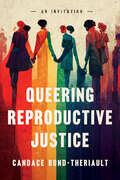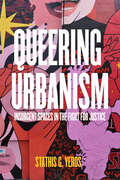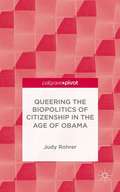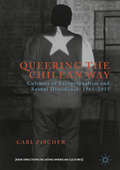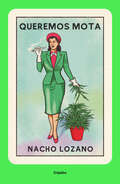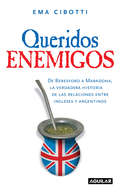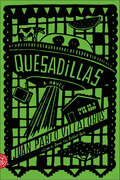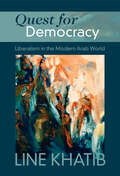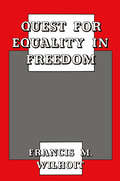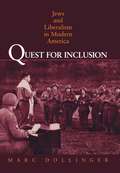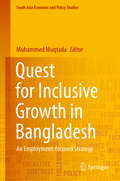- Table View
- List View
Queer Theory: Law, Culture, Empire
by Robert LeckeyQueer Theory: Law, Culture, Empire uses queer theory to examine the complex interactions of law, culture, and empire. Building on recent work on empire, and taking contextual, socio-legal, comparative, and interdisciplinary approaches, it studies how activists and scholars engaged in queer theory projects can unwittingly advance imperial projects and how queer theory can itself show imperial ambitions. The authors – from five continents – delve into examples drawn from Bollywood cinema to California’s 2008 marriage referendum. The chapters view a wide range of texts – from cultural productions to laws and judgments – as regulatory forces requiring scrutiny from outside Western, heterosexual privilege. This innovative collection goes beyond earlier queer legal work, engaging with recent developments, featuring case studies from India, South Africa, the US, Australasia, Eastern Europe, and embracing the frames offered by different disciplinary lenses. Queer Theory: Law, Culture, Empire will be of particular interest to students and researchers in the fields of socio-legal studies, comparative law, law and gender/sexuality, and law and culture.
Queer Theory: The French Response
by Bruno PerreauIn 2012 and 2013, masses of French citizens took to the streets to demonstrate against a bill on gay marriage. But demonstrators were not merely denouncing its damaging effects; they were also claiming that its origins lay in "gender theory," an ideology imported from the United States. By "gender theory" they meant queer theory in general and, more specifically, the work of noted scholar Judith Butler. Now French opponents to gay marriage, supported by the Vatican, are attacking school curricula that explore male/female equality, which they claim is further proof of gender theory's growing empire. They fear that this pro-homosexual propaganda will not only pervert young people, but destroy the French nation itself. What are the various facets of the French response to queer theory, from the mobilization of activists and the seminars of scholars to the emergence of queer media and the decision to translate this or that kind of book? Ironically, perceiving queer theory as a threat to France means overlooking the fact that queer theory itself has been largely inspired by French thinkers. By examining mutual influences across the Atlantic, Bruno Perreau analyzes changes in the idea of national identity in France and the United States. In the process, he offers a new theory of minority politics: an ongoing critique of norms is not only what gives rise to a feeling of belonging; it is the very thing that founds citizenship.
Queer Tolstoy: A Psychobiography
by Javier Sethness CastroQueer Tolstoy is a multidimensional work combining psychoanalysis, political history, LGBTQ+ studies, sexology, ethics, and theology to explore the life and art of Count Lev Nikolaevich Tolstoy. Using a psychobiographical framework, Sethness Castro uncovers profoundly queer dimensions in Tolstoy’s life experiences and art. Deftly contributing to the progressive and radical analysis of gender and sexuality, this book examines how Tolstoy’s erotic dissidence informed his anarchist politics, anti-militarist ideals, and voluminous literary production. Sethness Castro analyzes the influence of Buddha, Socrates, Jesus, Cervantes, Rousseau, Kant, Herzen, Proudhon, Chernyshevsky, and his mother Marya Volkonskaya on the artist's writings. Furthermore, he details Tolstoy's emblematic linking of LGBTQ+ desire with moral and erotic self-determination and resistance to Tsarist despotism—especially in War and Peace. This book is vital reading for those interested in the intersection of literature, psychoanalysis, queer studies, and Russian history.
Queer/Muslim/Canadian: Identities, Experiences and Belonging (Global Queer Politics)
by Momin Rahman Maryam KhanThis book presents original qualitative research on the lives, identities, and experiences of queer Canadian Muslims and is the largest study to date on this population. Presented through a queer intersectional framework, the volume contains core evidence-based chapters on the lived experience, as well as the transnational politics of Islamophobia and LGBTQ+ rights promotion, the research on Muslim attitudes to queer issues, and the representations of queer Muslim issues within Canada. Key issues covered include: queer Muslim organizing, how queer Muslims reconcile faith, sexuality and gender identity through affirmative and liberatory frameworks and actions, how Muslims in Canada respond to sexual and gender diversity. The contributors also lay out future academic and research possibilities for further investigation and for the development of equity practices for recognizing and challenging the oppressions suffered by queer Muslims, addressing the discussion to queer Muslims as well as mainstream LGBTQ+ groups and mainstream Muslim groups.
Queering Anarchism
by Deric Shannon Abbey Volcano J. Rogue Martha Ackelsberg C. B. Daring"A much-needed collection that thinks through power, desire, and human liberation. These pieces are sure to raise the level of debate about sexuality, gender, and the ways that they tie in with struggles against our ruling institutions."?Roxanne Dunbar-Ortiz, Outlaw Woman"Against the austerity of straight politics, Queering Anarchism sketches the connections between gender mutiny, queer sexualities, and anti-authoritarian desires. Through embodied histories and incendiary critique, the contributors gathered here show how we must not stop at smashing the state; rather normativity itself is the enemy of all radical possibility."-Eric A. Stanley, co-editor of Captive GendersWhat does it mean to "queer" the world around us? How does the radical refusal of the mainstream codification of GLBT identity as a new gender norm come into focus in the context of anarchist theory and practice? How do our notions of orientation inform our politics?and vice versa? Queering Anarchism brings together a diverse set of writings ranging from the deeply theoretical to the playfully personal that explore the possibilities of the concept of "queering," turning the dominant, and largely heteronormative, structures of belief and identity entirely inside out. Ranging in topic from the economy to disability, politics, social structures, sexual practice, interpersonal relationships, and beyond, the authors here suggest that queering might be more than a set of personal preferences?pointing toward the possibility of an entirely new way of viewing the world.Contributors include Jamie Heckert, Sandra Jeppesen, Ben Shepard, Ryan Conrad, Jerimarie Liesegang, Jason Lydon, Susan Song, Stephanie Grohmann, Liat Ben-Moshe, Anthony J. Nocella, A.J. Withers, and more.Deric Shannon, C.B. Daring, J. Rogue, and Abbey Volcano are anarchists and activists who work in a wide variety of radical, feminist, and queer communities across the United States.
Queering Anti-Zionism: Academic Freedom, LGBTQ Intellectuals, and Israel/Palestine Campus Activism
by Corinne E. BlackmerWith engaged scholarship and an exciting contribution to the field of Israel/Palestine studies, queer scholar-activist Corinne Blackmer stages a pointed critique of scholars whose anti-Israel bias pervades their activism as well as their academic work. Blackmer demonstrates how the Boycott, Divestment, and Sanctions (BDS) movement that seeks to delegitimize and isolate Israel has become a central part of social justice advocacy on campus, particularly within gender and sexuality studies programs. The chapters focus on the intellectual work of Sarah Schulman, Jasbir Puar, Angela Davis, Dean Spade, and Judith Butler, demonstrating how they misapply critical theory in their discussions of the State of Israel. Blackmer shows how these LGBTQ intellectuals mobilize queer theory and intersectionality to support the BDS movement at the expense of academic freedom and open discourse.
Queering Asylum in Europe: Legal and Social Experiences of Seeking International Protection on grounds of Sexual Orientation and Gender Identity (IMISCOE Research Series)
by Nuno Ferreira Moira Dustin Carmelo Danisi Nina HeldThis two-volume open-access book offers a theoretically and empirically-grounded portrayal of the experiences of people claiming international protection in Europe on the basis of their sexual orientation or gender identity (SOGI). It shows how European asylum systems might and should treat asylum claims based on people’s SOGI in a fairer, more humane way. Through a combined comparative, interdisciplinary (socio-legal), human rights, feminist, queer and intersectional approach, this book examines not only the legal experiences of people claiming asylum on grounds of their SOGI, but also their social experiences outside the asylum decision-making framework. The authors analyse how SOGI-related claims are adjudicated in different European frameworks (European Union, Council of Europe, Germany, Italy and UK) and offer detailed recommendations to adequately address the intersectional experiences of individuals seeking asylum. This unique approach ensures that the book is of interest not only to researchers in migration and refugee studies, law and wider academic communities, but also to policy makers and practitioners in the field of SOGI asylum.
Queering Colonial Natal: Indigeneity and the Violence of Belonging in Southern Africa
by T. J. TallieHow were indigenous social practices deemed queer and aberrant by colonial forces? In Queering Colonial Natal, T.J. Tallie travels to colonial Natalestablished by the British in 1843, today South Africa&’s KwaZulu-Natal provinceto show how settler regimes &“queered&” indigenous practices. Defining them as threats to the normative order they sought to impose, they did so by delimiting Zulu polygamy; restricting alcohol access, clothing, and even friendship; and assigning only Europeans to government schools. Using queer and critical indigenous theory, this book critically assesses Natal (where settlers were to remain a minority) in the context of the global settler colonial project in the nineteenth century to yield a new and engaging synthesis. Tallie explores the settler colonial history of Natal&’s white settlers and how they sought to establish laws and rules for both whites and Africans based on European mores of sexuality and gender. At the same time, colonial archives reveal that many African and Indian people challenged such civilizational claims. Ultimately Tallie argues that the violent collisions between Africans, Indians, and Europeans in Natal shaped the conceptions of race and gender that bolstered each group&’s claim to authority.
Queering International Law: Possibilities, Alliances, Complicities, Risks (Routledge Research in International Law)
by Dianne OttoThis ground-breaking collection reflects the growing momentum of interest in the international legal community in meshing the insights of queer legal theory with those critical theories that have a much longer genealogy – notably postcolonial and feminist analyses. Beyond the push in the human rights field to ensure respect for the rights of people with diverse sexual orientations and gender identities, queer legal theory provides a means to examine the structural assumptions and conceptual architecture that underpin the normative framework and operation of international law, highlighting bias and blind spots and offering fresh perspectives and practical innovations. The contributors to the book use queer legal theory to critically analyse the basic tenets and operations of international law, with many surprising, thought-provoking and instructive results. The volume will be of interest to many scholars, students and researchers in international law, international relations, cultural studies, gender studies, queer studies and postcolonial studies.
Queering International Law: Possibilities, Alliances, Complicities, Risks (Routledge Research in International Law)
by Dianne OttoThis ground-breaking collection reflects the growing momentum of interest in the international legal community in meshing the insights of queer legal theory with those critical theories that have a much longer genealogy – notably postcolonial and feminist analyses. Beyond the push in the human rights field to ensure respect for the rights of people with diverse sexual orientations and gender identities, queer legal theory provides a means to examine the structural assumptions and conceptual architecture that underpin the normative framework and operation of international law, highlighting bias and blind spots and offering fresh perspectives and practical innovations.The contributors to the book use queer legal theory to critically analyse the basic tenets and operations of international law, with many surprising, thought-provoking and instructive results. The volume will be of interest to many scholars, students and researchers in international law, international relations, cultural studies, gender studies, queer studies and postcolonial studies.
Queering Kinship: Non-heterosexual Couples, Parents, and Families in Guangdong, China (Gender, Sexuality and Global Politics)
by Han TaoBased on ethnographic fieldwork in Guangdong, China, this book asks: what does it mean for Chinese non-heterosexual people to go against existing state regulations and societal norms to form a desirable and legible queer family? Chapters explore the various tactics queer people employ to have children and to form queer or ‘rainbow’ families. The book unpacks people’s experiences of cultivating, or losing, kinship relations through their negotiation with biological relatives, cultural conventions and state legislations. Through its analysis, the book offers a new ethnographic perspective for queer studies and anthropology of kinship.
Queering Polishness in Polish Theatre Since 2005: Dissenting Bodies
by Jonas VanderschuerenTheatre has long been an art form at the centre of public life in Poland. Whether it is the self-professed poet-prophets of the Romantic era, or the dissident theatre makers working under the strictures of state socialism, the art form has played a vital role in the development of Polish culture and politics in the context of shifting foreign occupations. This book explores the relationship between contemporary Polish theatre makers and contemporary notions of Polishness and argues that queer theory, and specifically a Polish appropriation of queer theory, can be a crucial element to better understand the politicality of the contemporary Polish theatre field. It does this by focusing on critical theatre productions which are produced at the margins of the Polish theatre field, a choice which has been made as the field is dominated by traditional drama theatres which reproduce a Polish variation on the Western canon. This makes smaller, atypical, and independent theatre productions all the more significant, as they signify a refusal to continue the traditional role of the Polish theatre field in reproducing the canon of Polish Romanticism. As such, the book argues that contemporary Polish theatre has been marked by a struggle between those building performances and state authorities that see those creations as a threat to their authority.
Queering Rehoboth Beach: Beyond the Boardwalk
by James T. Sears“Create a More Positive Rehoboth” was a decades-long goal for progress and inclusiveness in a charming beach town in southern Delaware. Rehoboth, which was established in the 19th century as a Methodist Church meeting camp, has, over time, become a thriving mecca for the LGBTQ+ community. In Queering Rehoboth Beach, historian and educator James Sears charts this significant evolution. Sears draws upon extensive oral history accounts, archival material, and personal narratives to chronicle “the Battle for Rehoboth,” which unfolded in the late 20th century, as conservative town leaders and homeowners opposed progressive entrepreneurs and gay activists. He recounts not just the emergence of the gay and lesbian bars, dance clubs, and organizations that drew the queer community to the region, but also the efforts of local politicians and homeowners, among other groups who fought to develop and protect the traditional identity of this beach town. Moreover, issues of race, class, and gender and sexuality informed opinions as residents and visitors struggled with the AIDS crisis and the legacy of Jim Crow. Queering Rehoboth Beach is more than just an inspiring story about a community’s resilience and determination to establish a safe space for itself in the wake of the era of Don’t Ask, Don’t Tell. It is also a terrific beach read.
Queering Reproductive Justice: An Invitation
by Candace Bond-TheriaultThe futures of reproductive justice and LGBTQIA+ liberation are intimately connected. Both movements were born out of the desire to love and build families of our choosing—when and how we decide. Both movements are rooted in broader social justice liberationist traditions that center the needs of Black and brown communities, the LGBTQIA+ community, gender-nonconforming folks, femmes, poor folks, parents, and all those who have been forced to the margins of society. Taking as its starting point the idea that we all have the human right to bodily autonomy, to sexual health and pleasure, and to exercise these rights with dignity, Queering Reproductive Justice sets out to re-envision the seemingly disparate strands of the reproductive justice and LGBTQIA+ movements and offer an invitation to reimagine these movements as one integrated vision of freedom for the future. Candace Bond-Theriault asserts that for reproductive justice to be truly successful, we must acknowledge that members of the LGBTQIA+ community often face distinct, specific, and interlocking oppressions when it comes to these rights. Family formation, contraception needs, and appropriate support from healthcare services are still poorly understood aspects of the LGBTQIA+ experience, which often challenge mainstream notions of the nuclear family, and the primacy of blood-relatives. Blending advocacy with a legal, rights-based framework, Queering Reproductive Justice offers a unified path for attaining reproductive justice for LGBTQIA+ people. Drawing on U.S. law and legislative history, healthcare policy, human rights, and interviews with academics and activists, Bond-Theriault presents incisive new recommendations for queer reproductive justice theory, organizing, and advocacy. This book offers readers an invitation to join the conversation, and ultimately to join the movement to that is unapologetically queering reproductive justice.
Queering Urbanism: Insurgent Spaces in the Fight for Justice
by Stathis G. YerosA free ebook version of this title is available through Luminos, University of California Press’s Open Access publishing program. Visit www.luminosoa.org to learn more. Conflicts about space and access to resources have shaped queer histories from at least 1965 to the present. As spaces associated with middle-class homosexuality enter mainstream urbanity in the United States, cultural assimilation increasingly erases insurgent aspects of these social movements. This gentrification itself leads to queer displacement. Combining urban history, architectural critique, and queer and trans theories, Queering Urbanism traces these phenomena through the history of a network of sites in the San Francisco Bay Area. Within that urban landscape, Stathis Yeros investigates how queer people appropriated existing spaces, how they expressed their distinct identities through aesthetic forms, and why they mobilized the language of citizenship to shape place and secure space. Here the legacies of LGBTQ+ rights activism meet contemporary debates about the right to housing and urban life.
Queering the Biopolitics of Citizenship in the Age of Obama
by Judy RohrerWhere dominant citizenship narratives have heretofore focused on either the state or the nation as qualifiers of belonging, this book draws from the interdisciplinary fields of queer theory, critical race theory, feminist political theory, disability studies, and indigenous studies to further an evolving discussion of what it means to be an American citizen in the Obama era. Rohrer demonstrates that this discussion requires an understanding of the machinations of governmentality and biopolitics in the (re)production of the (proper) citizen.
Queering the Chilean Way
by Carl FischerThis book examines and critiques the fact that Chile's claims to economic exceptionalism have been embodied, often quite aggressively, in a heterosexual, and primarily male, ideal. Despite the many shifts Chilean economics and politics have undergone over the past fifty years, the country's view of itself as a "model" in contrast to other Latin American countries has remained constant. By deploying an artistic, literary, and cinematic archive of queer figures from this period, this book draws parallels among the exceptionalisms of Chile's economic discourse, the subjects deemed most (and least) apt to embody it, and the maneuvers of its cultural production between local and global ideas of gender and politics to delineate its place in the world. Queering the Chilean Way thus sheds light on the sexual, economic, and aesthetic dimensions of exceptionalism--at its heart, a discourse of exclusion that often comprises a major element of nationalism--in Chile and throughout the Americas.
Queremos mota
by Nacho Lozano“La 4T incluye una política de drogas de cuarta.” Fue una promesa de campaña, pero la legalización de la mariguana no ha llegado. Fue un compromiso público, pero la amnistía a consumidores encarcelados no se concretó. Fue un lema mil veces repetido, pero la política antidrogas sigue idéntica. No es sólo una omisión o un simple olvido. Es una traición que afecta a decenas de miles de mexicanos y que se ensaña con las mujeres. Es un cálculo político que cierra la puerta a posibilidades médicas, comerciales y lúdicas, y que pone al país en desventaja. Es una decisión consciente que perpetúa la guerra y la muerte. En esta obra, Nacho Lozano explica la gravedad de la situación y sus implicaciones. Sin dramatismos, pero sin morderse la lengua, nos cuenta todo lo que los mexicanos estamos perdiendo y los escenarios que se nos vienen encima si no hay un cambio pronto. Con los datos más recientes, los argumentos más lúcidos y la inteligencia más afilada, eleva la voz y exige: ¡Queremos mota!
Queridos enemigos
by Ema CibottiDe Beresford a Maradona, la verdadera historia de las relaciones entre ingleses y argentinos. Invasiones inglesas, usurpación de las Malvinas, Vuelta de Obligado, pacto Roca-Runciman, debate de las carnes... ¿los ingleses siempre quisieron dominarnos? Si hubieran triunfado en 1806, ¿estaríamos igual o mejor que países como Canadá o Australia, como muchos sostienen? ¿Amigos o enemigos? ¿Odiadios por colonialistas o admirados por su solvencia, eficacia y corrección social? Aprendimos desde chicos que Inglaterra -como nombramos comúnmente al Reino Unido- es nuestra enemiga y que desde 1806 hasta ahora siempre lo ha sido. Pero si esa creencia fuera cierta, ¿patriotas como Mariano Moreno o Manuel Belgrano habrían tejido alianzas con ellos?, ¿San Martín habría aceptado la ayuda de la comunidad británica radicada en estas tierras o ponderado la conducta del ministro inglés George Canning? Cuando Rosas decidió exiliarse en Gran Bretaña, ¿ignoraba que pocos años antes él mismo se había enfrentado armas en mano contra la flota "pirata" anglofrancesa? Basada en una investigación veraz y rigurosa, la historiadora Ema Cibotti demuestra que la sociedad argentina no vio siempre a los ingleses como corsarios ambiciosos, y que, a pesar de las nefastas intervenciones de 1806 y 1982, nunca dejaron de conformar una de las comunidades de residentes extranjeros más importantes de nuestro país, si no en número, en empuje e influencia. Contra las interpretaciones lineales y simplistas de nuestra historia, Queridos enemigos nos invita a soltar las cadenas que nos atan a una visión desfigurada de nuestro pasado para encarar responsablemente el tiempo que nos toca vivir.
Quesadillas: A Novel
by Juan Pablo VillalobosA brilliant new comic novel from "a linguistic virtuoso" (José Antonio Aguado, Diari de Terrassa)It's the 1980s in Lagos de Moreno—a town where there are more cows than people, and more priests than cows—and a poor family struggles to overcome the bizarre dangers of living in Mexico. The father, a high-school civics teacher, insists on practicing and teaching the art of the insult, while the mother prepares hundreds of quesadillas to serve to their numerous progeny: Aristotle, Orestes, Archilochus, Callimachus, Electra, Castor, and Pollux. Confined to their home, the family bears witness to the revolt against the Institutional Revolutionary Party and their umpteenth electoral fraud. This political upheaval is only the beginning of Orestes's adventures and his uproarious crusade against the boredom of rustic life and the tyranny of his older brother. Both profoundly moving and wildly funny, Mexican author Juan Pablo Villalobos's Quesadillas is a satiric masterpiece, chock-full of inseminated cows, Polish immigrants, religious pilgrims, alien spacecraft, psychedelic watermelons, and many, many "your mama" insults.
Quest for Democracy: Liberalism in the Modern Arab World
by Line KhatibSince the uprisings of 2010 and 2011, it has often been assumed that the politics of the Arab-speaking world is dominated, and will continue to be dominated, by orthodox Islamic thought and authoritarian politics. Challenging these assumptions, Line Khatib explores the current liberal movement in the region, examining its activists and intellectuals, their work, and the strengths and weaknesses of the movement as a whole. By investigating the underground and overlooked actors and activists of liberal activism, Khatib problematizes the ways in which Arab liberalism has been dismissed as an insignificant sociopolitical force, or a mere reaction to Western formulations of liberal politics. Instead, she demonstrates how Arab liberalism is a homegrown phenomenon that has influenced the politics of the region since the nineteenth century. Shedding new light on an understudied movement, Khatib provokes a re-evaluation of the existing literature and offers new ways of conceptualizing the future of liberalism and democracy in the modern Arab world.
Quest for Equality in Freedom
by Francis M. WilhoitThis book describes and analyzes the gravest crisis now facing constitutional democracy: the fundamental conflict between liberal and egalitarian values. Particularly stressed in this analysis are such aspects of the crisis as its origins, ideological tensions, and public policy ramifications.
Quest for Inclusion: Jews and Liberalism in Modern American
by Marc J. Dollinger<p>For over sixty years, Jews have ranked as the most liberal white ethnic group in American politics, figuring prominently in social reform campaigns ranging from the New Deal to the civil rights movement. Today many continue to defy stereotypes that link voting patterns to wealth. What explains this political behavior? Historians have attributed it mainly to religious beliefs, but Marc Dollinger discovered that this explanation fails to account for the entire American Jewish political experience. In this, the first synthetic treatment of Jewish liberalism and U.S. public policy from the 1930s to the mid-1970s, Dollinger identifies the drive for a more tolerant, pluralistic, and egalitarian nation with Jewish desires for inclusion in the larger non-Jewish society. <p>The politics of acculturation, the process by which Jews championed unpopular social causes to ease their adaptation to American life, established them as the guardians of liberal America. But, according to Dollinger, it also erected barriers to Jewish liberal success. Faced with a conflict between liberal politics and their own acculturation, Jews almost always chose the latter. Few Jewish leaders, for example, condemned the wartime internment of Japanese Americans, and most southern Jews refused to join their northern co-religionists in public civil rights protests. When liberals advocated race-based affirmative action programs and busing to desegregate public schools, most Jews dissented. In chronicling the successes, limits, and failures of Jewish liberalism, Dollinger offers a nuanced yet wide-ranging political history, one intended for liberal activists, conservatives curious about the creation of neo-conservatism, and anyone interested in Jewish communal life.</p>
Quest for Inclusive Growth in Bangladesh: An Employment-focused Strategy (South Asia Economic and Policy Studies)
by Muhammed MuqtadaThis book offers a selection of intensely researched essays focused on the critical planning objectives and policy priorities that would enhance the promotion of inclusive growth in a developing country. It has taken Bangladesh as the case study. It argues for rethinking of traditional policies and provides arguments and ways to reorient these toward inclusive growth and better social inclusion. These involve a dedicated focus on employment and inclusion in the design of monetary and fiscal policies, trade and industrial policies, policies toward rural non-farm employment, social protection and safety net strategy and the nature of institutional and governance reforms which are imperative for ensuring inclusive growth. The studies included in the book were prepared before or at the onset of the ongoing COVID-19 pandemic and the unfolding economic crisis; yet they provide cursory observations on its likely impact, and underscore how the stated principles and policies of an inclusive growth strategy have become even more significant in the present situation. Bangladesh has been growing respectably during the past decade and a half and has arguably shown strong progress in several social indicators. However, inequality and vulnerability are rising alarmingly, and the economy is beset with high levels of corruption, as well as with various other governance deficits that can adversely affect future growth and social inclusion. The book provides a critical assessment of how far growth in Bangladesh has been inclusive, both over time, and in comparison to selected South and Southeast Asian countries. It constructs a specific ‘inclusive growth index’ with reference to what the study considers as the significant goals and pillars of inclusive growth. Bangladesh is not the only developing country that is faced with the arduous task of tackling unbalanced economic growth and of implementing the 2030 Agenda. Rising vulnerability, inequality, disappointing job growth and poor governance are also major challenges to inclusive growth for many countries in the Global South. Therefore, the appeal of this book extends well beyond the borders of Bangladesh and the South Asian region. Corresponding to SDG 8, the book is aimed at academia, researchers, policymakers, civil society leaders as well as other national and international development practitioners with an avid interest in issues concerning growth with equity, and in sync with the 2030 Agenda for Sustainable Development. In addition, the book is a valuable resource for interested students of disciplines related to economics and development policy.
Quest for Power: European Imperialism and the Making of Chinese Statecraft
by Stephen R. HalseyChina's late-imperial history has been framed as a long coda of decline, played out during the Qing dynasty. Reappraising this narrative, Stephen Halsey traces the origins of China's current great-power status to this so-called decadent era, when threats of war with European and Japanese empirestriggered innovative state-building and statecraft.
